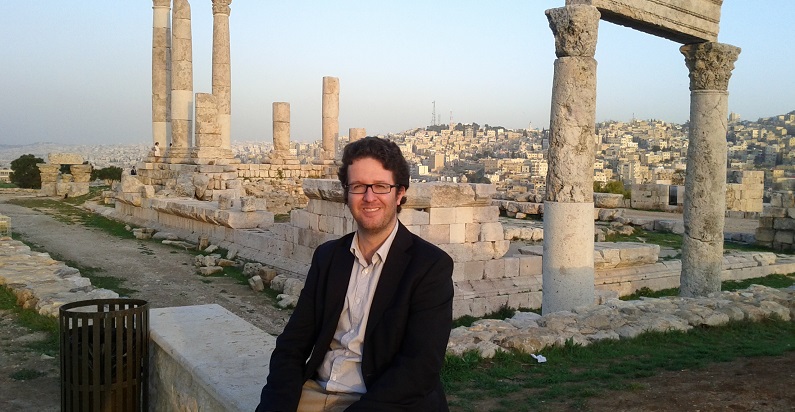-
13 August 2014
Category : Interview
“Jordan’s problems with renewable energies are similar to those overcome by Spain”
Entrevista a David Poza, Consejero Residente del proyecto de electricidad y energías renovables que lidera la FIIAPP en Jordania y técnico del Instituto para la Diversificación y Ahorro de la Energía (IDAE)Interview with David Poza, Resident Adviser for the electricity and renewable energies project being led by the FIIAPP in Jordan and technician at Instituto para la Diversificación y Ahorro de Energía (IDAE).

Jordan has barely enough natural resources to satisfy the energy needs of its nearly eight million inhabitants, factories and businesses. This is so much the case that its energy production is 96% dependent on imports, especially of crude oil and natural gas. The Jordanian government is trying to put an end to this situation by strengthening its National Electric Power Company (NEPCO) and, one of the tools it has for doing this is a project financed by the European Union and managed by the FIIAPP. The Foundation staff member coordinating it on the ground, David Poza, explains Jordan’s situation and its immersion in renewable energies in this interview.
What led Jordan to request this project?
In the general framework of agreements between the European Union and Jordan, the energy sector is key. Jordan’s need to have a more efficient system for its electrical grid, to reduce its dependence on other countries and to introduce renewable energies led Jordan to request this project from the European Union.
The energy Jordan produces is 96% dependent on imports of crude oil, natural gas, electricity… Will this percentage go down with this project?
The project is going to contribute to them managing their system efficiently. The Jordanian government has a plan for the next two years that consists of introducing renewable energies and buying liquefied gas on the market in Aqaba. By doing so, they aim to reduce the cost of electricity. Jordan has a problem that is very similar to Spain’s: the electric bill doesn’t cover the full cost of the electricity. In the end, NEPCO (the power company for which we are carrying out the project, the equivalent of the Spanish Electrical Network, REE) pays what the consumer isn’t paying, adding to its debt. And, as it’s a public company, this is adding to the country’s debt. So, looking more at five-six years, they will continue introducing renewables and opt for other types of measures to continue reducing the cost of electricity; among other things, they are considering a nuclear power plant.
Another objective is to improve the strategic planning, management and efficiency of NEPCO… What are the strong points of this system?
We have to keep in mind that the Jordanian electrical system is small if we compare it, for example, to that of Spain. The peak demand in Spain is 45,000 megawatts, and in Jordan it’s 3,000. That’s 15 times lower than in Spain. With the introduction of renewable energies and improvement of their grid, they’re going to need support and to change their model. The points to be strengthened in their system involve moving from a manual system to an automatic one, which means introducing new software that will facilitate the work and training NEPCO personnel so that they know how to confront these changes.
And this consists of training, which we are providing…
This is a Twinning project. It means sharing Spain’s experience in this area with the Jordanian technicians. Spain is sharing its experience with Jordan and, at the same time, the Jordanians are getting an idea of how to solve the problems they’re going to be facing. But, no doubt, there are also training activities, and these are focused on these points I just mentioned.
What are the renewable energies that the country will be in the best position to develop considering that it is a country with limited resources…
In the case of Jordan, they have a good attitude towards solar power, especially photovoltaic, and wind power. Regarding solar power, thermoelectric is not being ruled out, but it isn’t as well suited as photovoltaic because of problems with water and gas.
What else is Spain contributing to the project?
What Spain is contributing is its experience and its know-how, as it is a leader and pioneer in the integration of renewable energies in the REE. And Spain has similarities with Jordan with respect to its electrical grid: the connections it has with other countries, that it is considered an energy island… In a way, Jordan’s problems with renewable energies are similar to the ones overcome by Spain several years ago. So, Spain is contributing the experience of how we solved problems that are similar to the ones they now have to solve.
In terms of benefits, what will be the final benefit to the country and its citizens?
It will have significant repercussions. Jordan is a country that has practically no natural resources. It’s not just a question of water, food or oil. For example, 20% of the country’s GNP is dedicated to purchasing from other countries what they need to produce energy. So this project is going to contribute to them having greater political independence from the countries in the region; it will reduce their energy spending; and they will be able to invest what they save on other things, such as social and economic issues. Lastly, there is also the reduction in the cost of electricity. Companies will be able to be more competitive and invest more in the country, and consumers will save money if the Jordanian government decides to reduce their bill.
The views and opinions expressed in this blog are the sole responsibility of the person who write them.






